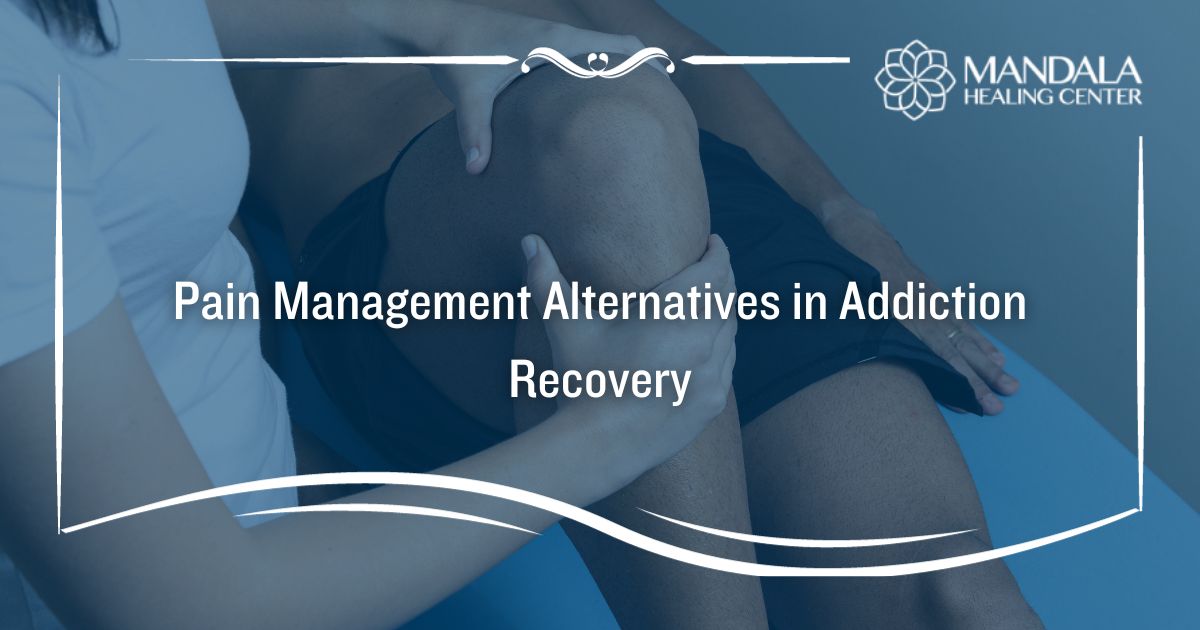Pain is an unfortunate and sometimes unavoidable part of every person’s life. People may experience pain after surgery or other medical procedures, due to a chronic medical condition, after an injury, or as a symptom of a temporary ailment.
While pain is an unavoidable part of life, there are many effective strategies available for reducing or managing pain that can allow people to function and feel more comfortable throughout their day.
Medications can help people manage their pain, reduce inflammation, and feel relief. Some drugs typically prescribed to help patients manage pain can be addictive, and people must take them only under careful medical supervision.
But what about people already living with addiction or those recovering from addiction? Many medications used to treat moderate to severe pain may complicate treatment for addiction or pose the risk of dependence and addiction. So, what are some alternative pain management in addiction recovery strategies?
This article will explore practical ways people in recovery can use to manage pain and live more comfortably without jeopardizing their progress or risking dependence and addiction. Reach out to the Mandala Healing Center Specialists now to learn about our holistic approach to addiction treatment or for support during any stage of addiction recovery.
Pain Relievers and the Risk of Addiction
Doctors frequently prescribe opioid medications to help their patients manage moderate to severe pain. Opioids are potent drugs that help people reduce pain and live more comfortably. People may receive a prescription for opioids after undergoing surgery, during treatment for a chronic condition, to alleviate discomfort from an injury, or for other conditions causing pain.
But opioids are highly addictive, and many people develop dependence on them–even when taking them as prescribed. As medical professionals have become aware of the increased risk for dependence and addiction, they have begun prescribing them less often and for shorter periods. Still, in 2019, doctors wrote over 150 million prescriptions for opioids.
Common opioid drugs include:
- Oxycodone (OxyContin, Percocet)
- Morphine
- Codeine
- Fentanyl
- Hydrocodone (Vicodin)
Because of the high risk for addiction, people in recovery are often advised to avoid taking opioid medications and other addictive drugs. This is especially true for people with a history of opioid abuse and addiction.
Alternative Pain Management in Addiction Recovery
While people in addiction recovery should not take opioid medications, finding alternative pain management strategies is essential. Without managing a person’s pain, they are more likely to use drugs or alcohol to cope.
There are many alternative pain management strategies people in recovery can use to live more comfortably without risking their sobriety. Here are some of the most effective alternative pain management in addiction recovery strategies.
Over-the-counter pain relievers
Research shows that over-the-counter pain relievers like ibuprofen and acetaminophen can be just as effective at reducing pain as opioid drugs. Many medical professionals advise that people in recovery– and those with a family history of substance abuse or addiction– should use non-prescription pain meds instead of opioids or other potentially addictive drugs.
Physical therapy
Physical therapists are pain reduction experts who can help you create an exercise plan to increase comfort and range of motion while limiting pain and inflammation. Physical therapy may include movement exercises, massage, warm water therapy, and other non-pharmaceutical pain reduction methods.
Psychological treatment
Pain has physical and psychological components, and getting psychological help can reduce your perceived pain levels. Trained pain therapists typically work with patients once or twice a week and implement cognitive behavioral therapy strategies to help people reframe their pain and increase their coping skills without using medications.
Nerve blocks
Nerve pain and muscle spasms can make people feel miserable, limit their mobility, and interfere with their ability to function in their daily lives. People with some forms of pain may be eligible for shots of local anesthetics or pain relievers that intercept pain messages between the body and brain. This allows people to live comfortably without relying on opioids or other medications.
Acupuncture
Acupuncture is an alternative pain-relieving treatment that has gained popularity in recent years. During an acupuncture session, a highly trained acupuncturist will insert thin needles into the skin on different areas of the body. This can block pain signals between the body and brain and requires no medications, complicated treatments, or risk of addiction.
Pain management in addiction recovery doesn’t have to be complicated to be effective. People often find alternative pain management methods are more effective and sustainable than taking medications. This allows them to live with more comfort and mobility without the risk of becoming dependent or addicted or jeopardizing their recovery progress.
Find Pain Management in Addiction Recovery
If you are recovering from addiction or struggling with substance misuse, you do not have to live with pain. Reach out to the specialists at the Mandala Healing Center now to learn about our holistic approach to addiction treatment or to discover new ways to manage pain without taking addictive medications.












